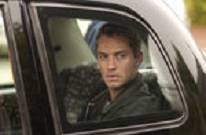|
|
||||
|
|
by Betty Jo Tucker  Robbery and romance collide in Breaking and Entering, a surprisingly lethargic drama, especially considering the high-powered talent involved here. Written and directed by Anthony Minghella and starring such fine actors as Jude Law, Juliette Binoche and Robin Wright Penn, this human interest story about intersecting lives in contemporary Law portrays Will, a landscape architect working on plans to improve Meanwhile, after teenage Miro (Rafi Gavron) breaks into Willís workplace and steals his architectural drawings plus his laptop, he ponders over what he should do about it. The right answer? Probably anything other than setting up a stakeout to find out the thiefís identity -- but thatís exactly the way Will handles the situation. He ends up following the boy to see where he lives, then meeting the ladís beautiful widowed mother Amira (Juliette Binoche) -- a refugee from While working on this Breaking and Entering review, I realized something strange: writing about the movie is more exciting than watching the film itself. For some reason or other, this picture came across as cold and distant to me. I couldnít get involved with the characters or with their problems no matter how much I wanted to, perhaps because of a lack of energetic performances. Law brings very little of the charm he displayed in The Holiday or in Alfie to his character; Binoche looks luminous as always, but her acting seems stilted in comparison to her sensitive work in films like Chocolat and The English Patient; and Wright Penn appears lost, perhaps because her lines must be delivered with a Swedish accent. Making a meaningful film about the problems of immigrants and class differences in todayís (Released by Metro-Goldwyn-Mayer and rated ďRĒ for sexuality and language.)
|
||
|
© 2026 - ReelTalk Movie Reviews Website designed by Dot Pitch Studios, LLC |




